Traub Lieberman Attorneys Recognized as 2022 Illinois Super Lawyers® and Rising Stars
February 21, 2022 —
Traub LiebermanTraub Lieberman is pleased to announce that two Partners from the Chicago, IL office have been selected to the 2022 Illinois Super Lawyers list. In addition, three Partners have been named to the 2022 Super Lawyers Rising Stars list.
2022 Illinois Super Lawyers
2022 Super Lawyers Rising Stars
Read the court decisionRead the full story...Reprinted courtesy of
Traub Lieberman
20 Years of BHA at West Coast Casualty's CD Seminar: Chronicling BHA's Innovative Exhibits
May 03, 2018 —
Beverley BevenFlorez-CDJ STAFFThe Bert L. Howe & Associates, Inc., (BHA) exhibit has been a fixture at West Coast Casualty's Construction Defect Seminar since the mid-1990's. Through the years, BHA has updated their display, but no matter what year, you could count on the BHA exhibit to provide a not-to-be-missed experience.
2008-BHA's sleek, rear projection display includes a screen that promotes the firm's capabilities that can be seen throughout the exhibit hall. This would be one of many innovations BHA has brought to the West Coast Casualty seminar.
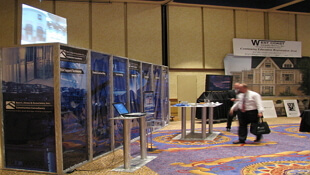
2009-With the success of the rear screen projection, BHA adds additional monitors to provide attendees with more information about BHA.
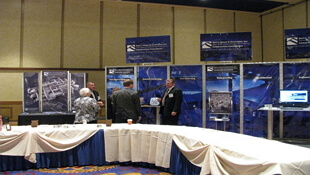
2010-BHA adds an interpretive professional development exhibit targeted to Building Envelope issues allowing adjusters and other non-construction professionals hands on access to the systems and components at the heart of many related such claims.



2011-BHA's Swing for Charity challenge is born.

2012-Always innovating, BHA expands its rear projection and professional development offerings to West Coast attendees.

2013-BHA showcases additional capabilities with a twenty-four foot, custom, convex, immersive video experience.

2014-BHA adds an iPhone display to give a hands-on demonstration of their data collection methods.
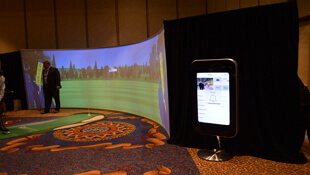
2015-BHA's twenty-four foot , custom, convex, immersive video experience was elevated with two additional rear projection screens, reflecting BHA's newest capabilities and services.

2016-BHA dazzles attendees with their new exhibit comprised of more than 15 integrated, high definition, LCD displays. iPads are stationed on tables to conveniently demonstrate BHA's data collection processes.
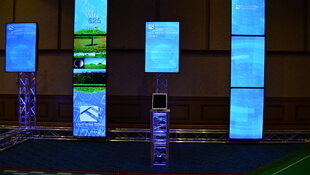
2017-BHA's Swing for Charity Golf Challenge raised $2,225.00 for the National Coalition for Homeless Veterans and $1,900 for Final Salute.
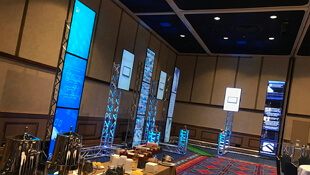
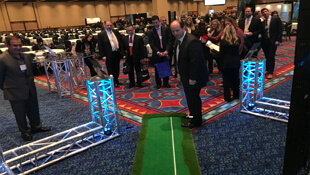
Read the court decisionRead the full story...Reprinted courtesy of
Traub Lieberman Partner Michael Logan and Associate Christian Romaguera Obtain Voluntary Dismissal in Favor of Construction Company Under the Vertical Immunity Doctrine
June 21, 2024 —
Christian Romaguera - Traub LiebermanIn a lawsuit filed in Orange County, Traub Lieberman Partner Michael Logan and Associate Christian Romaguera achieved a voluntary dismissal in favor of their Client, a construction company. The Plaintiff claimed that he was seriously and permanently injured, and demanded $1,000,000.00. The Plaintiff turned out to be an employee of our Client’s subcontractor, and the Plaintiff received worker’s compensation benefits from his employer, the subcontractor. Under Florida Statute § 440.11(1), “The liability of an employer . . . shall be exclusive and in place of all other liability, including vicarious liability, of such employer to any third-party tortfeasor and to the employee . . .” When a subcontractor provides workers’ compensation benefits to its injured employee, workers’ compensation immunity would not only apply to the subcontractor but to the general contractor as well. This is also known as “vertical immunity.” The Traub Lieberman team filed a detailed motion and memorandum of law to argue its case, and the Plaintiff voluntarily withdrew the claim against the Client just before that motion was set to be argued before the Judge.
Read the court decisionRead the full story...Reprinted courtesy of
Christian Romaguera, Traub LiebermanMr. Romaguera may be contacted at
cromaguera@tlsslaw.com
Competition to Design Washington D.C.’s 11th Street Bridge Park
May 07, 2014 —
Beverley BevenFlorez-CDJ STAFFAccording to Architect Magazine, eighty landscape architecture and architecture firms (forty teams) submitted proposals to design the $25-million Washington D.C. 11th Street Bridge Park project. A jury has shortlisted six design teams: “Wallace Roberts & Todd (WRT)/Next Architects, Piet Oudolf with Glenn LaRue Smith/PUSH Studio/WXY Architecture + Urban Design, OLIN/OMA, Workshop: Ken Smith Landscape/Davis Brody Bond, Stoss Landscape Urbanism/Höweler + Yoon Architecture, and Balmori Associates/Cooper, Robertson & Partners.”
The “nonprofit Building Bridges Across the River at THEARC (Town Hall Education Arts Recreation Campus) and the District's Office of Planning” launched the competition in March of this year. Architect Magazine stated that “the goal of” the project is to unify “what some call a ‘long-divided city,’ by connecting Capitol Hill and Anacostia, the neighborhoods on either side of the river.”
Read the court decisionRead the full story...Reprinted courtesy of
A Court-Side Seat: Permit Shields, Hurricane Harvey and the Decriminalization of “Incidental Taking”
May 31, 2021 —
Anthony B. Cavender - Gravel2GavelThis is a brief review of some of the significant environmental (and administrative law decisions) released the past few weeks.
THE U.S. SUPREME COURT
On April 22, 2021, the Court decided two important administrative law cases: Carr, et al. v. Saul and AMG Capital Management v. Federal Trade Commission.
Carr, et al. v. Saul
In this case, the constitutionality of Social Security Administrative Law Judges (ALJs) hearing disability claims disputes was at issue. More precisely, were these ALJs selected in conformance with the Appointments Clause of the Constitution? A similar issue was litigated in the case of Lucia v. Securities and Exchange Commission. There, the Court held that many of the agency’s ALJs were not selected in conformance with the Appointment’s Clause. Here, the Court held that this issue could be decided by the courts without compelling the litigants to first exhaust their administrative remedies. Thousands of ALJs are employed by the federal government, and it may take some time to resolve this question for every agency.
AMG Capital Management v. Federal Trade Commission
In this case, the court held, unanimously, that the Commission does not presently have the authority to employ such equitable remedies as restitution or disgorgement.
Read the court decisionRead the full story...Reprinted courtesy of
Anthony B. Cavender, PillsburyMr. Cavender may be contacted at
anthony.cavender@pillsburylaw.com
Ignoring Employee ADA Accommodation Requests Can Be Costly – A Cautionary Tale
March 29, 2021 —
Peter Shapiro - Lewis BrisboisAs all employers should well know by now, the Americans with Disabilities Act (ADA) and many state and local counterparts may require employers to engage in an interactive process in response to a disabled employee’s request for a workplace accommodation. A recent ruling by the First Circuit Court of Appeals illustrates why employers have a very strong financial incentive to be proactive in adopting and rigorously enforcing their disability accommodation policies.
In Burnett v. Ocean Properties, decided on February 2, 2021, a wheelchair user employed by a hotel chain call center complained internally that the office’s entrance was not accessible to him. It had heavy doors beyond which was a downward slope that caused the plaintiff’s wheelchair to roll backwards as the door closed on him, requiring him to exert greater force as he struggled to enter. He asked that push-button automatic doors be installed. The employer did not take any meaningful steps to address the complaint with the plaintiff. Eventually he was injured as he tried to open the door. Still, the employer did not follow up on his accommodation request. The plaintiff eventually filed an administrative charge with the Maine Human Rights Commission. The employer met with the plaintiff at that time, but claimed lack of familiarity with ADA compliance requirements and took no action to address the complaint. The plaintiff eventually resigned and filed suit in federal court when the administrative process was completed.
Read the court decisionRead the full story...Reprinted courtesy of
Peter Shapiro, Lewis BrisboisMr. Shapiro may be contacted at
Peter.Shapiro@lewisbrisbois.com
Pinnacle Controls in Verano
February 21, 2013 —
CDJ STAFFThe California Court of Appeals has applied the California Supreme Court’s recent Pinnacle decision to a new case, Verano Condominium Association v. La Cima Development. As in Pinnacle, La Cima sought to compel arbitration of construction defect claims with a homeowners association. The trial court denied La Cima’s attempt to compel arbitration on the grounds that the arbitration agreement was made with the individual homeowners and not the homeowners association. Further, it was determined that the CC&Rs “were unenforceable due to unconscionability.”
La Cima appealed, and the appeals court affirmed in part and reversed in part. After Pinnacle, La Cima sought a review. The Supreme Court of California directed the appeals court to vacate their earlier decision and reconsider, based on Pinnacle.
The Fourth Circuit Court has concluded that this conflicted with the ruling in Pinnacle. There, as in Verano, homeowners signed agreements that disputes with the developer would be settled through binding arbitration. The appeals court had found for the community association, but on review, the California Supreme Court reversed this decision.
The California Court of Appeals had two issue to consider in this review: whether the arbitration provisions applied to the homeowners association, and whether these provisions were unconscionable. The court concluded that “in light of Pinnacle it is clear the arbitration provisions set forth in the Verano CC&Rs constitute a valid agreement to arbitrate.” On the second question, the Verano CC&Rs were described by the court as “materially indistinguishable” from those in the earlier case. As the state Supreme Court found that those were not unconscionable, clearly neither were these.
The case was remanded for further proceedings and La Cima is entitled to recover the costs of the appeal.
Read the court decisionRead the full story...Reprinted courtesy of
California Appeals Court Remands Fine in Late Completion Case
November 18, 2011 —
CDJ STAFFThe California Court of Appeals in Stanislaus County has reversed the decision of the lower court in Greg Opinski Construction Inc. v. City of Oakdale. The earlier court had awarded the city of judgment of $54,000 for late completion, $3,266 for repair of construction defects and interest, and $97,775 in attorneys’ fees. The late completion of the project was due to actions by the City of Oakdale, however, the court rejected Opinski’s argument that the California Supreme Court decision in Kiewit did not allow this, as his contract with the city established a procedure for claiming extensions.
The appeals court noted that the Kiewit decision has been “criticized as an unwarranted interference in the power of contracting parties to shift the risk of delays caused by one party onto the other party by forcing the second party to give the first notice of any intention to claim an extension of time based on delays caused by first.” They cited Sweet, a professor at Boalt Hall, UC Berkeley’s law school, that Kiewit “gutted” the “provision that conditions the contractor’s right to claim an extension of time for delays beyond his control.”
Further changes in California law in response to the Kiewit decision lead to the current situation which the court characterized as “if the contractor wished to claim it needed an extension of time because of delays caused by the city, the contractor was required to obtain a written change order by mutual consent or submit a claim in writing requesting a formal decision by the engineer.”
Opinski also argued that the lower court misinterpreted the contract. The Appeals court replied that “Opinski is mistaken.” He cited parts of the contract regarding the increase of time, but the court rejected these, noting that “an inability to agree is not the same as an express rejection.”
The court also rejects Opinski’s appeal that “the evidence the project was complete earlier than September 30, 2005, is weightier than the evidence to the contrary,” which they describe as “not a winning appellate argument.” The court points out that the role of an appeals court is not to reweigh the evidence, but to determine “whether the record contains substantial evidence in support of the judgment.”
The court did side with Opinski on one question of the escrow account. They rejected most of his arguments, repeating the line “Opinski is mistaken” several times. They decided that he was mistaken on the timing of the setoff decision and on whether the city was the prevailing party. However, the appeals court did find that Opinski was not liable for interest on the judgment.
The appeals court rejected the awarding of prejudgment interest to the city as the funds from which the judgment was drawn was held in an escrow account. The court noted that the city had access to the funds and could “access the funds when it determined that Opinski had breached the contract.” The appeals court noted that the judgment exhausted the escrow balance and remanded the case to the lower court to determine the amount own to Opinski.
Read the court’s decision…
Read the court decisionRead the full story...Reprinted courtesy of




































































